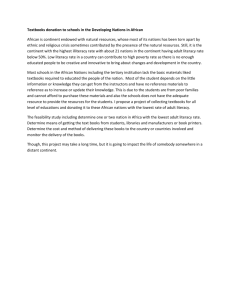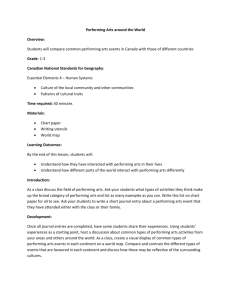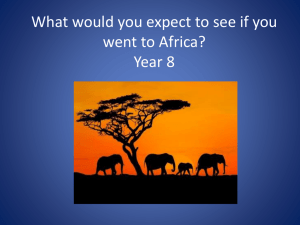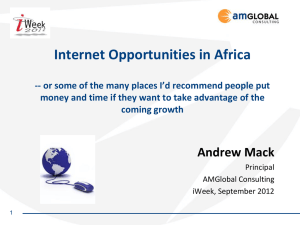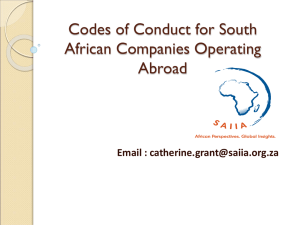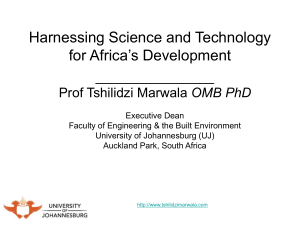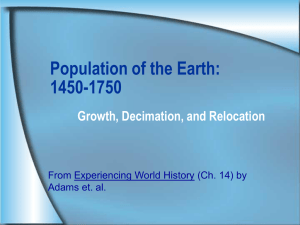France, Europe and Africa: towards a new partnership in an era of
advertisement
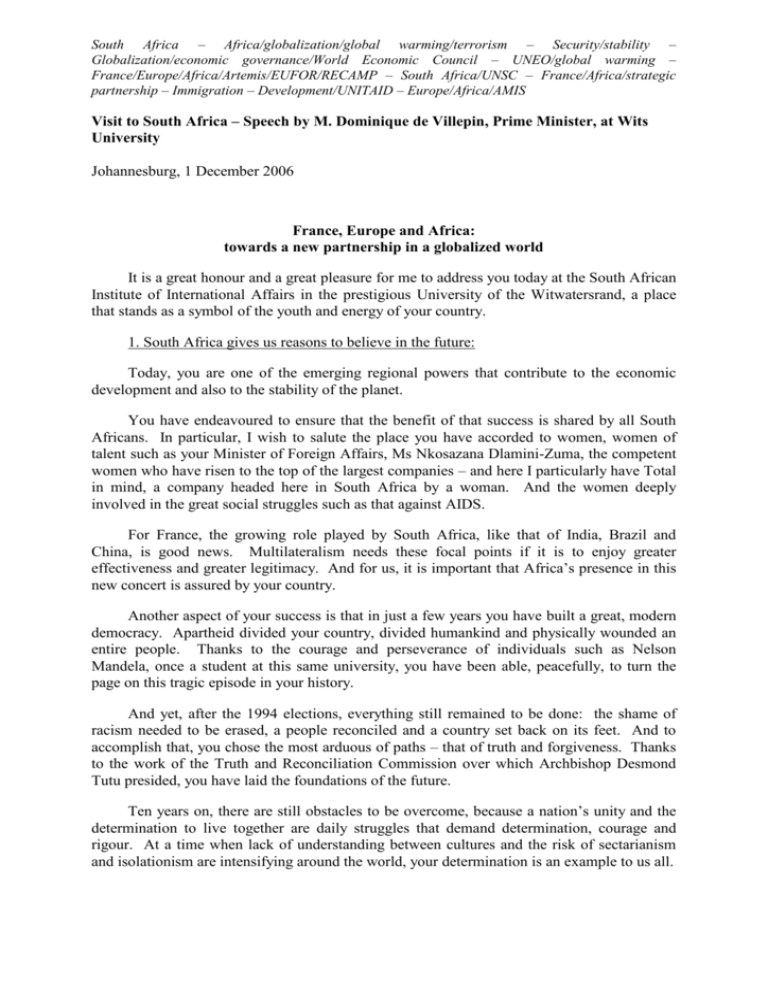
South Africa – Africa/globalization/global warming/terrorism – Security/stability – Globalization/economic governance/World Economic Council – UNEO/global warming – France/Europe/Africa/Artemis/EUFOR/RECAMP – South Africa/UNSC – France/Africa/strategic partnership – Immigration – Development/UNITAID – Europe/Africa/AMIS Visit to South Africa – Speech by M. Dominique de Villepin, Prime Minister, at Wits University Johannesburg, 1 December 2006 France, Europe and Africa: towards a new partnership in a globalized world It is a great honour and a great pleasure for me to address you today at the South African Institute of International Affairs in the prestigious University of the Witwatersrand, a place that stands as a symbol of the youth and energy of your country. 1. South Africa gives us reasons to believe in the future: Today, you are one of the emerging regional powers that contribute to the economic development and also to the stability of the planet. You have endeavoured to ensure that the benefit of that success is shared by all South Africans. In particular, I wish to salute the place you have accorded to women, women of talent such as your Minister of Foreign Affairs, Ms Nkosazana Dlamini-Zuma, the competent women who have risen to the top of the largest companies – and here I particularly have Total in mind, a company headed here in South Africa by a woman. And the women deeply involved in the great social struggles such as that against AIDS. For France, the growing role played by South Africa, like that of India, Brazil and China, is good news. Multilateralism needs these focal points if it is to enjoy greater effectiveness and greater legitimacy. And for us, it is important that Africa’s presence in this new concert is assured by your country. Another aspect of your success is that in just a few years you have built a great, modern democracy. Apartheid divided your country, divided humankind and physically wounded an entire people. Thanks to the courage and perseverance of individuals such as Nelson Mandela, once a student at this same university, you have been able, peacefully, to turn the page on this tragic episode in your history. And yet, after the 1994 elections, everything still remained to be done: the shame of racism needed to be erased, a people reconciled and a country set back on its feet. And to accomplish that, you chose the most arduous of paths – that of truth and forgiveness. Thanks to the work of the Truth and Reconciliation Commission over which Archbishop Desmond Tutu presided, you have laid the foundations of the future. Ten years on, there are still obstacles to be overcome, because a nation’s unity and the determination to live together are daily struggles that demand determination, courage and rigour. At a time when lack of understanding between cultures and the risk of sectarianism and isolationism are intensifying around the world, your determination is an example to us all. 2 With a national economy that produces a quarter of all the continent’s wealth, South Africa is the symbol of African Renaissance. Your dynamic energy makes you an example for the continent as a whole, a continent that is changing and moving forward. I know how committed you are to ensuring that it too goes down the road of development, democracy and peace. France and Europe wish to work with you in a special partnership that must be an opportunity for the whole of Africa. 2. All of us, together, have a rendezvous with Africa. The danger today is that this will be a missed rendezvous. The danger is that Africa will suffer the most brutal changes brought about by globalization without enjoying its benefits. If Africa does not succeed in defending its interests more effectively, it could see its wealth of raw materials work against it. We are all aware today of the danger constituted by the illegal exploitation of resources by criminal networks. If Africa does not succeed in developing its companies and industries more effectively, it will continue to suffer from fluctuating commodity prices and the aggressive trade practices of others. The danger, finally, is the one that globalization is posing to the environment. Today, Africa is the region that produces the least pollution in the world, but it is Africa that will bear the full brunt of the consequences of climate warming. In addition to grave problems of drought, 70 million Africans will eventually be obliged by rising sea levels to leave the coastal areas. 3. That is a situation nobody can accept. We cannot be satisfied with the place now accorded to Africa in globalization. We cannot accept Africa being the neglected continent, nor it becoming a “mine” of resources for the world. Nor can we stand idly by while crises and violence threaten the stability of that continent. Because what is at stake today in Africa is the future of all of us. It is a certain conception of humankind, nourished by the culture and knowledge of past millennia. It is the very equilibrium of the planet, it is the preservation of the environment, it is the struggle against the great global epidemics. It is our own security. We see this in the rise of Islamic fundamentalism in some regions. We see it in the terrorist groups establishing themselves in the Sahel Strip and the Horn of Africa. We see it in the crises swiftly spreading from country to country, and here I have particularly in mind Sudan, Chad and the Central African Republic. 4. If it is to control its destiny, Africa must first be able to assure its stability and security. It is my firm belief that only the African States themselves can do this. They must, of course, be able to count on the commitment of the international community. I know that this is a conviction shared by President Mbeki, to whom I wish to pay tribute for his role as mediator, notably in Burundi, the Comoros and the Democratic 3 Republic of Congo, where the electoral process has at last been concluded with the holding of the presidential election. But the priority today is to strengthen the role of the regional organizations. France supports the efforts of the African Union in all its mediation work, whether it be in Côte d'Ivoire or Darfur. We also believe that sub-regional organizations such as ECOWAS, SADC, EMCCA and IGAD have a crucial role to play in bringing stability to the continent. 5. Africa must be able to compete on a level playing field in a globalized world. Because Africa faces special challenges, its place in the world must be special. We must make available new tools to enable us to go forward towards a form of globalization that is fairer, more balanced. That is in the interest of the planet as a whole. This is true, firstly, in the economic sphere. Africa must participate more fully in global economic governance. The priority is for Africa to take up its full role in international trade. Today, we can see clearly that free trade alone cannot be a solution, because the opportunities are not equal for all. It is not possible to treat in the same way countries that can count on several sectors, and others that, like many African counties, are largely dependent on cocoa, zinc or cotton. All of which has to lead us to rethink the organization of trade on the basis of a single principle: fairer, enforceable rules by which all abide. The World Trade Organization must go further in its implementation of incentives, safeguards and protection specific to the African continent. Africa must have greater weight in international financial institutions. The allocations of "free quotas" for low-income countries approved in September at the annual meetings of the International Monetary Fund and the World Bank is a first step. France will pursue its efforts in this direction. For greater effectiveness, we need an overarching vision. Two weeks ago, I proposed the setting-up of a World Economic Council. This would be tasked with building such a new approach and laying down clear guidelines for the World Trade Organization, the IMF and the World Bank, in addition to the economic and social institutions of the United Nations. The Council, which would meet at head of State and government level, must accord to the aspirations and challenges of Africa the place they deserve. Secondly, Africa must possess the wherewithal to protect its exceptional riches and heritage. For Africa is, especially in terms of its biodiversity, an invaluable source of global public goods for all of us. Here again, we need tools for governance commensurate with what is at stake. The setting-up, as President Jacques Chirac has proposed, of a United Nations Environment Organization is today a priority. South Africa is, alongside France, at the forefront of the combat against global warming. On this point, we share the same demand: I know that you have launched a policy of diversification and promotion of clean, renewable energies. The French government has taken measures along these lines. I have also proposed the establishment at European level of a CO2 tax on products imported from countries that do not adhere to the Tokyo Protocol. Let us 4 combine our efforts to ensure the implementation of the roadmap defined here in Johannesburg in 2003. 6. In the face of these challenges, France and Europe bear a special responsibility. Like other countries in Europe, France and Africa maintain long-standing ties which run deep, forged by history and the ordeals we have gone through together. We must be able to look at those ordeals head on and clear-sightedly. Nothing must be left unsaid, none of the suffering of slavery must be forgotten. Nor must we remain silent on any of the consequences of colonization, which I know has left deep wounds. But that which brings us closer together is stronger than that which distances us from one another. What brings us together are our peoples, who know and talk to each other. It is precisely because we have been able to speak to each other frankly and as friends throughout the last few decades that we have been able to overcome every difficulty. Today, the words that best describe the relationship that France wishes to build with Africa are “loyalty” and “respect”. France has faith in the future of Africa, a continent whose changing face and aspirations it is understanding better. For some years now, France has chosen to stand alongside Africans in the gravest crises. That is why it currently deploys over 10,000 military personnel on the continent, working for regional stability and international security. That commitment is made in agreement with the international community and the countries concerned. It is made increasingly within a European framework, as was the case in the Democratic Republic of Congo, with the support provided by Operation Artemis to stabilize the province of Ituri and by EUFOR to guarantee the smooth running of the recent presidential election. It goes hand in hand with a commitment to reinforce African peacekeeping capacities, notably through the RECAMP programme for the reinforcement of African peacekeeping capabilities. Standing before you today, I wish to say this very clearly: when faced with a crisis, France does not choose a side to back, it chooses peace. It does not defend regimes, it defends values: respect for human rights and the protection of civilian populations, sovereignty of States, the integrity of their territory and the defence of international law and justice. Confronted with the crisis in Côte d’Ivoire, France acted according to its conscience. It shouldered its responsibilities, deploying nearly 4,000 troops over the last four years. It did so under a United Nations mandate and alongside the African Union. For many Africans, it helped avoid civil war. Today, the situation continues to be precariously balanced and the people of Côte d'Ivoire may feel that no progress is being made. The international community must mobilize around two objectives: disarming the militias and holding free and fair elections. UNSCR 1721 laid down the framework for this process and the transition now taking place. All concerned must now shoulder their respective responsibilities. 5 France needs the Republic of South Africa to help ensure that reason and the rule of law prevail. The accession of South Africa to the Security Council next year will enable us to act together to that end. This is also our shared responsibility. 7. Over and above the security issues, France wishes to build a new strategic partnership with Africa. France wishes to build a relationship between equals. I know that this is a concern also felt by you with regard to the other countries of Africa. First and foremost, our country wishes to establish a dialogue with Africa as a whole. With the French-speaking countries of course, with which we have forged long-standing and deep-rooted ties. But, as the next Africa-France summit will testify in February 2007, our commitment in Africa is to all African countries. It was for that reason that in June this year we broadened the remit of the French Development Agency to include the whole of Africa, which was not hitherto the case. It is also to ensure that the voice of the whole of the African continent can be heard more clearly that France is committed to working for a broadening of the membership of the United Nations Security Council, which must also benefit the countries of Africa. What we wish to build is a partnership that respects the interests of all concerned. Take the issue of migration for example. Between now and 2050, the population of Africa will double, while that of Europe will decline by 10%. We can all see the challenge this represents, for Africa itself and for Europe, and one that we shall meet by better control of migration flows. We will not accomplish this by constraint alone. Of course, strict border surveillance is a necessity, but as long as men and women are prepared to risk their lives to come and work illegally, there will be no long-term solution. The solution is a genuine partnership between the countries of origin, transit and destination, one in which each partner is able to defend its own interests. For France, this means combating illegal immigration while ensuring better integration of foreign nationals who are legally present. It is in the interest of the transit countries to improve control of the migration routes and clandestine traffic. It is in the interest of the countries of origin to enable their nationals to contribute to their country's economic development and achieve their full potential there. In the long run this means that we must reflect together on how to facilitate the movement of skills and talents between Africa and Europe. We shall have to be particularly vigilant with regard to the issue of the elites, who must be able to place their expertise and knowledge at the service of their countries. Europe must of course continue to welcome students from Africa. But we can also, through our corporate sector and education system, support the efforts African States are making on training. The partnership we wish to propose to Africa is also one based on an effective development policy. Let’s be clear about this: where development aid is concerned, it is time for a step change. We know that we must double the amount of aid going to Africa between now and 6 2050. By increasing development assistance to 0.7% of GDP by 2012, France is intent on making its full contribution to that effort. Our policy on development will be effective if we set ourselves three requirements: First requirement: clear targets. It is for this reason that France wishes to set with the recipient countries precise targets in the priority areas – health and education – for action over the long term. Second requirement: dialogue and concerted action with recipient countries. The key to development is in the hands of Africans themselves. We shall be all the more effective if we are capable of adapting our solutions to local contexts, taking ideas from what works and improving what does not work. That is what we are doing here: I have in mind the success of the programme I shall be visiting shortly in Soweto that assists local authorities in improving access to water. I am also thinking of our cooperation programme directed at enabling private banks to finance the economic initiatives of the poorest members of the community, and their access to housing, health services and education. Third requirement: closer association of the private sector with our cooperation policy. We know that the efforts made by States will not be enough alone and that we must, as of now, put new sources of finance in place. That is what we have done to expand the resources to combat AIDS, tuberculosis and malaria, launching, at the instigation of President Jacques Chirac, a levy on air tickets. We have also acted to ensure that the funds will go in priority to Africa: in 2007, €165 million from the Global Fund should be going to Sub-Saharan Africa. France instigated UNITAID, which, acting in support of the new national plan, will allow hundreds of children in South Africa access to treatment. 8. In building this new partnership, Europe is Africa's best ally. Europe is now the primary provider of aid there. It is Europe that has the longest experience of cooperation in Africa. It is Europe that is doing the most to promote the stability of the continent. But it must now go further, using the process of African regional integration as a springboard. France will play to the full its role in helping it progress in this direction. In the field of peace and security, the prerequisites for development, Europe has put in place a European Peace Facility, which has notably enabled it to be the leading contributor to the funding of AMIS in Darfur. In the field of development aid, between now and 2015 Europe will devote more than 50% of the new resources to Africa. For our new partnership to succeed, we must place dialogue with the countries of the South on a par with the EU’s internal policies. I am also keen that a study should be made of the possibility of creating a European financial mechanism for co-development. This would allow us to improve the pooling and coordination of European and African capabilities. And lastly, in the field of trade, it is France’s wish that the new economic partnership agreements between Europe and Africa serve the interests of Africans well, by allowing them to move closer to WTO rules of course, but above all by taking into account the specific 7 characteristics of the countries concerned and allowing them the possibility of preparing themselves for this. Ladies and gentlemen, I have spoken of the ties uniting France and Africa. But over and above the ties of the past, we must now be guided by those of the future. Because France is not happy with the world as it is. It is unhappy about the vulnerability and new inequalities that the race for competitiveness is in danger of bringing with it. It will not accept the destruction of the environment. It rejects the standardization and levelling that blur difference and distinctive identity. Here in Johannesburg, you show us that nothing is inevitable and that determination, courage and ambition can change a nation’s face in the space of a few years. Africa is not just one continent among others. It is the home of all civilizations. It teaches us fraternity, openness to others, respect for identity and for nature. We need Africa, we need an Africa that has regained control over its destiny and makes its voice heard on the international stage. Let us work together to build a world in which all countries can open up to the others while retaining their own identities, a world not divided into winners and losers, a world which thinks about the generations to come, a world of equality and stability. Thank you./.
